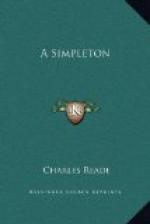The blow seemed to drive her deeper into her work. She leaned over it, graceful as a willow, and so absorbed, she could not even see the door of the room open and Dr. Staines come in.
All the better: her not perceiving that slight addition to her furniture gives me a moment to describe him.
A young man, five feet eleven inches high, very square shouldered and deep chested, but so symmetrical, and light in his movements, that his size hardly struck one at first. He was smooth shaved, all but a short, thick, auburn whisker; his hair was brown. His features no more then comely: the brow full, the eyes wide apart and deep-seated, the lips rather thin, but expressive, the chin solid and square. It was a face of power, and capable of harshness; but relieved by an eye of unusual color, between hazel and gray, and wonderfully tender. In complexion he could not compare with Rosa; his cheek was clear, but pale; for few young men had studied night and day so constantly. Though but twenty-eight years of age, he was literally a learned physician; deep in hospital practice; deep in books; especially deep in German science, too often neglected or skimmed by English physicians. He had delivered a course of lectures at a learned university with general applause.
As my reader has divined, Rosa was preparing the comedy of a cool reception; but looking up, she saw his pale cheek tinted with a lover’s beautiful joy at the bare sight of her, and his soft eye so divine with love, that she had not the heart to chill him. She gave him her hand kindly, and smiled brightly on him instead of remonstrating. She lost nothing by it, for the very first thing he did was to excuse himself eagerly. “I am behind time: the fact is, just as I was mounting my horse, a poor man came to the gate to consult me. He had a terrible disorder I have sometimes succeeded in arresting—I attack the cause instead of the symptoms, which is the old practice—and so that detained me. You forgive me?”
“Of course. Poor man!—only you said you wanted to see papa, and he always goes out at two.”
When she had been betrayed into saying this, she drew in suddenly, and blushed with a pretty consciousness.
“Then don’t let me lose another minute,” said the lover. “Have you prepared him for—for—what I am going to have the audacity to say?”
Rosa answered, with some hesitation, “I must have—a little. When I refused Colonel Bright—you need not devour my hand quite—he is forty.”
Her sentence ended, and away went the original topic, and grammatical sequence along with it. Christopher Staines recaptured them both. “Yes, dear, when you refused Colonel Bright”—
“Well, papa was astonished; for everybody says the colonel is a most eligible match. Don’t you hate that expression? I do. Eligible!”
Christopher made due haste, and recaptured her. “Yes, love, your papa said”—




